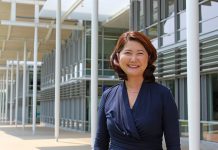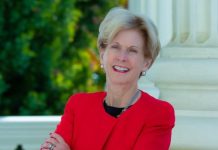Students at Corona del Mar school were encouraged at an assembly on Wednesday to step up and be “change agents” rather than just bystanders if they witness bullying.
Jerry Weichman, Ph.D., the speaker at the 10th Annual Unity Assembly at CdM, told the students not to be afraid to speak up for what’s right.
“I think it’s really important for [kids] to stand on their own and stand up for what they believe in,” said Weichman, a clinical psychologist and adolescent specialist at Hoag Neurosciences Institute, Hoag Memorial Presbyterian Hospital. “So many kids are afraid to stick out… They follow the herd constantly in life… Why are trying to fit in if you were born to stand out?”
There’s a huge bystander effect happening at schools and communities everywhere, Weichman said, people don’t get involved because they think others will do something or it’s not their business, and ultimately, if everyone is just a bystander, nothing is done to stop it.

Weichman encourages students to step up and say something if someone is getting bullied. Even if they aren’t involved directly, it‘s not their fight, they have an obligation to stand up and say something.
“If you don’t, you’re giving the bully the green light,” he said.
If one person stand up, others are likely to as well, Weichman said.
“Jerry [Weichman’s] anti-bully presentation at our Unity Assembly supports the HRC mission- to inspire positive action and change across campus, promoting unity and providing tools to empower teens,” said Denise Weiland, advisor for the CdM Human Relations Council, which sponsored the assembly with support from the ASB and the school administration.
Weichman’s message fits in perfectly with this year’s HRC anti-bully campaign, said HRC president, senior Oren Shaolian, “Be the Arrow: Lead others in the right direction.”
Last year, the HRC had a different anti-bullying campaign, targeted more at identifying the problem, spreading the knowledge that bullying is a problem on campus and urging kids to think before they speak. This year, the club’s campaign will give students tools to stop bullying
“We’re striving to get that message (of anti-bullying) across,” he said.
Usually anti-bullying movements go after the bully, Shaolian said, but this year, the HRC plans to try and empower the bystander.
The HRC and the Unity Assembly help get the message out there, Shaolian said.
“It’s a great way to start the year,” said Eric Lam, a specialist for the Orange County Human Relations Council, a community group that works with the school HRC. “It helps set the tone [for the year]. And it sends a really strong message for students to grab onto and levitate towards. So when they’re reminded throughout the year, they remember what it is.”
To sustain the positive climate change on campus, follow up activities will be conducted throughout the year by the Human Relations Council. So it’s not just a concept, but actual tools for the students to use, Lam said.
They have their annual retreat on Oct. 22, where they will plan out the strategy for the rest of the year and decide what kind of events to hold that support their campaign.
“We’re happy with the strides [CdM school] is making,” Lam said. “Last year [the bullying problem] was brought to light… This year we want to think, ‘How can we begin to take a step?’”
The basic goal of the Orange County Human Relations Council is to eliminate prejudice and discrimination in Orange County, Lam said.
The county group works with the CdM Human Relations Council through their “Bridges” program, along with 20 other schools in the county.
“We’re trying to build a school that’s more safe physically and socially and more inclusive and equitable,” Lam said. They partner with the students, administration and teachers, he added, but the students are the driving force behind it and they can influence their peers the most.
“Youth are the main agents of change,” he said.
The Unity Assembly is a great way to get a message to these young change agents.
The assembly started in 2002 as a way to honor the heroes who sacrificed their lives on 9/11, Weiland said. It was very well received, she said, so they planned another assembly in 2003 and invited speakers to talk about how students can make a difference in their school and community. The event has evolved over the years since.
Various speakers, including Weichman in 2005, have talked to the students about life experiences, tools for teens, leadership, and even the “spirit of ubuntu” about forgiveness and reconciliation in 2007 from Linda Biehl.
For the last two years, the HRC invited Rachel’s Challenge Foundation, who encouraged the students to start a chain reaction of kindness and compassion.
This year, Weichman returned with his anti-bully message, which fits with the student group’s 2011-2012 campaign of “Be the Arrow: Lead others in the right direction”
The student members try to be catalysts for positive change, Shaolian said, and this campaign is just one way to try and make a difference.
Weichman was bullied too, he said. When he was an infant he had to have his right leg amputated.
“Even as a little kid, I knew if I stood out, I was going to be bullied,” Weichman said.
He tried to cover it with pants as best he could, but things got tough for him during a game of kickball when the ball wasn’t the only thing flying through the air.
It wasn’t easy for him growing up, he said. But things do get better, he added.
And in the meantime, there are ways to deal with bullies, he explained.
He talked about different ways to deal with bullies, including teaching kids to think about who the bullies really are and how to feel sorry for them instead of feeling angry.
Weichman encouraged the kids to think about why the bully is acting the way he or she is, they might feel insecure or have problems at home, he said.
“When you think about these things, you actually rise up above it,” he said.
Also, teaching kids to focus on the positives about themselves and empowering them to have self-confidence and self-esteem makes a big difference, he added.
“You don’t want to just put wind into the sails,’ Weichman said. “You want to prevent the wind from being sucked out.”
“It’s a toxic mix if you have a bully with a kid that has low self-esteem,” he warned.
A child with confidence, a positive attitude, good posture and carries themselves with pride can be a deterrent for a bully, he said.
Weichman encourages kids to say something if they see any kind of bullying going on. A lot of teens see or hear fighting, bickering, gossiping or similar bullying and consider it “drama,“ so they stay out of it, Weichman said.
It’s not just drama, he said, it’s bullying.
It’s even worse nowadays with all the instant communication technology.
Kids live in a world, Weichman said, that they can go home from school, to the safety of their own home and then to the privacy of their own room and still get bullied via text, instant message or online social sites.
“You can’t escape it,” he said. There’s no getting away from it when they are so connected, tethered to each other, the way kids are in today’s world. “It’s just the age you live in.”
That’s why it needs to be stopped at the first sign. Students need to speak up, parents need to be proactive and school administrations need to have consequences for bullying, Weichman said.
He wants to empower them to be change agents, he said, people that facilitate change, that take that step and actually do something.
“You can make a difference,” Weichman told the students. “You can change, not just that one kid and your friends, but your community… And the nation as a whole.”





after reading this syrupy sweet article, I need insulin
Dr. Weichman is teaching kids to stand up to bullies and to call them out on their cruel behavior. It’s so important that he is helping kids learn to be self-confident, too, which will serve them well during their school years and beyond as bullies can be in the work place too. Thank you very much, Dr. Weichman, for helping to make this world a better place!
Thank you for sharing this story, and thank you HRC of CDMHS for your efforts to stop bullying.